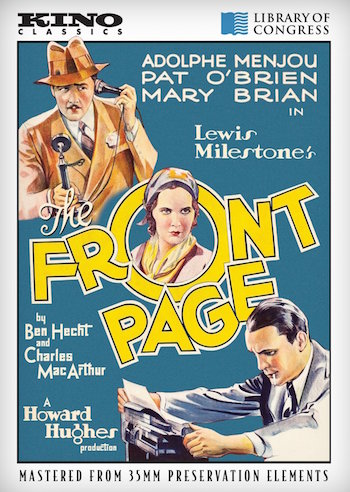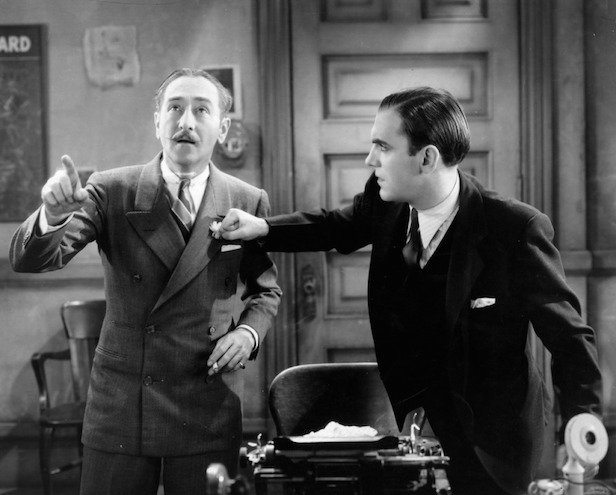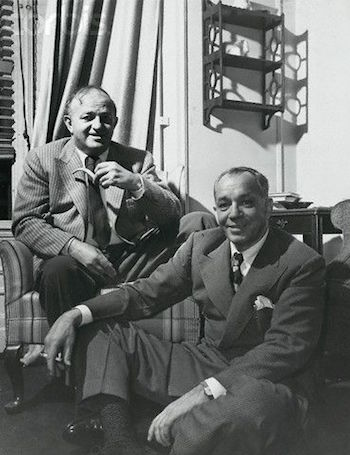Film DVD Review: 1931’s “The Front Page” — Restored
The improved viewing experience of the 1931 version of The Front Page does much to underline the stature of director Lewis Milestone as an early-talkie innovator and to show off the crack ensemble cast.
By Betsy Sherman

The first film version of Ben Hecht and Charles MacArthur’s iconoclastic play The Front Page has been kicking around for years, but it’s usually been seen in washed-out 16mm prints or on TV broadcasts that may have had its racier exchanges snipped out. But even if you’ve previously seen this adaptation, starring Pat O’Brien and Adolphe Menjou, under optimum conditions, you may not have appreciated its ramshackle jazz like you will in its new restoration. This 1931 comedy directed by Lewis Milestone and adapted for the screen by Bartlett Cormack and Charles Lederer has been restored by the Library of Congress and released on DVD and Blu-ray by Kino Lorber. Supplementing the picture are an excellent commentary track by filmmaker/scholar Bret Wood and two old-time radio adaptations. The improved viewing experience does much to underline the stature of Milestone as an early-talkie innovator and to show off the crack ensemble cast.
Vintage-film fans rightly treasure Howard Hawks’ heterosexual twist on The Front Page: in His Girl Friday, star reporter Hildy Johnson (Rosalind Russell) is not only a woman, but also the ex-wife of managing editor Walter Burns (Cary Grant). The gender reversal was clever in 1940, but what we now crave is subtext, and the ’31 production delivers. What its authors called “a Damon and Pythias love affair” between reporter and managing editor, we can archly label homoerotic while chanting from the bleachers “get a room!”
Most of the movie takes place in the shabby Criminal Courts press room as the reporters engage in a perpetual poker game to pass the time until Earl Williams, a down-and-out anarchist convicted of killing a black policeman, is executed by hanging. With an election coming up and the black vote up for grabs, the mayor and sheriff have, according to the cynical reporters, scapegoated Williams. This same night, 30-year-old reporter Hildy Johnson, who has spent half his life under the wing of The Morning Post’s ruthless editor Walter Burns, plans to make a clean break from the yellow press (“You ever come up out of a sewer?,” he asks fiancée Peggy, maybe not rhetorically). Hildy means to move to New York with his new bride and take a lucrative job in her uncle’s Fifth Avenue ad agency. The movie follows Burns’ efforts to throw obstacles in Hildy’s way, although the younger man is done in by his own inability to walk away from a scoop that could save Williams’ neck and stick it to the corrupt politicians. The moral of Hildy’s story is that nothing could be worse than joining the middle class.
Hecht, in his affectionate biography of MacArthur, Charlie, wrote about the impetus to write The Front Page: “Our news sources were the plot turns of passion and skullduggery … It was as natural for a police reporter to start writing a novel or play as it was for an ant to climb a grass blade.” During the late 1910s and early 1920s, the men worked for rival Chicago papers. It was MacArthur who learned at the feet of Chicago Herald and Examiner editor Walter Howey, upon whom Burns was based. They each left for New York in 1924, and it was there that they became writing partners. The Front Page opened on Broadway in August of 1928 and was a sensation, notorious for its use of profanity. It was explicitly rooted in Chicago, referring to people and incidents both indirectly and by name (there was a real Hilding Johnson, although Hildy was also based on MacArthur). Although the co-writers didn’t adapt The Front Page for the screen, they went on to great success in Hollywood, collaborating on movies such as Gunga Din and Wuthering Heights and co-directing some distinctive independent features. Hecht became one of the most valuable and prolific screenwriters of the studio era.

Pat O’Brien and Adolphe Menjou in a scene from the 1931 film version of “The Front Page.”
The film rights for The Front Page were bought by maverick producer Howard Hughes, who enlisted Lewis Milestone to direct. A Russian-Jewish émigré who started in the silents and helmed a string of quality projects in several genres right through to Ocean’s 11 (1960) and Mutiny on the Bounty (1962), Milestone was basking in the glow of his Academy Award triumph for the 1930 All Quiet on the Western Front. For the role of Hildy, they chose the little-known stage actor Pat O’Brien. Burns would be played by Louis Wolheim, who memorably played the bulldog-like sergeant in All Quiet. During rehearsals, Wolheim died of stomach cancer. His replacement was the dapper Adolphe Menjou. The two leads shared a necessary talent for putting across dialogue at a breakneck speed (Mae Clarke, who plays self-confessed streetwalker Molly Malloy, wrote in her autobiography that O’Brien showed up to the set convinced he was going to be playing the role of the editor, although thankfully the confusion was cleared up without incident).
The play may be from 1928 and be channeling events that took place circa 1919, but the movie has the energy and attitude of its own time. The convergence is of the pioneering transitional period of early sound film, the so-called pre-Code era when censorship could still be skirted, and the depth of the Hoover-era Depression during which trust in authority was at rock bottom. Milestone sets the hardboiled tone in the opening frames, purely cinematically. The film opens with a close-up of a sack of flour that reads “Sunshine Flour Insures Domestic Happiness.” Thud—the sack is being used as a surrogate executionee by disdainful prison workers making a dry run. Literal gallows humor.
Before the Hildy-Burns plot kicks in, we’re treated to racy banter amongst the reporters. Tacked up on the press room walls are pictures of topless women. Locations at which Burns’ lackey searches for Hildy include a speakeasy and the multi-mirrored entrance to a whorehouse. And wait a minute—did the laconic reporter played by Matt Moore really just stick his middle finger in the faces of the sanctimonious mayor and weasly sheriff? Yet the film isn’t uniformly backhanded and flippant: there’s a beautifully acted moment of sincere feeling between George E. Stone as the momentarily free Williams and Clarke as the woman who sheltered him when he was in need.

Ben Hecht and Charles McArthur
Considering the bulky camera and sound equipment with which he had to work, Milestone did a superb job of ensuring that The Front Page didn’t feel stage bound. The showiest move is using a circular dolly to get unbroken shots of the reporters sitting around the table that dominates the press room (to mention just a few of these amazing character actors, there’s Walter Catlett, Frank McHugh and Edward Everett Horton as a hypochondriac who insists his sandwich be made with “gluten bread”). This technique makes possible that standout “get a room” moment, when Burns joins Hildy in the press room that’s otherwise empty except for Williams stashed in a roll-top desk. While delivering their mile-a-minute lines that concern Burns puffing up Hildy’s ego so he’ll ditch his marriage plans, Menjou and O’Brien glide around the table several times executing choreography worthy of ice dancers.
You’ll thank yourself for taking the time to listen to the Bret Wood commentary, as doing so will enable you to use terms like “circular dolly” with confidence. It isn’t only on the technical front that he’s helpful. He gives background info on many of the personalities involved in the project and explains why, in spite of the story owing so much to the rich history of crime and corruption in Chicago, a title card announces “This story is laid in a Mythical Kingdom.” Especially fun are tales of Hughes and Milestone finding ways around the dictates of the censors at the Hays Office.
The picture quality is quite good for a 1931 film made outside of the major studios, for which there isn’t a surviving negative (I watched the DVD, not the Blu-ray). The sound quality is inconsistent, which can be attributed to the deficiencies of the time period.
The Front Page radio adaptations date from 1937 and 1946. The former, on the hour-long Lux Radio Theater hosted by Cecil B. DeMille, is frankly a travesty. The property has been sitcom-ized and padded with weak one-liners. Starring as Hildy is print-and-radio gossipmonger (and future TV’s Untouchables narrator) Walter Winchell, who’s well able to machine-gun dialogue but unable to give it meaning. The ’46 show is Academy Award Theater, which, although it reduces the feature to a mere half-hour (including commercials), is truer to the original. O’Brien and Menjou recreate their roles, speaking molasses-slowly, compared to the movie. Truly the only distinctive moment in these extras is a program note spoken by the Lux announcer on June 28, 1937: “We had hoped at this time to bring you Miss Amelia Earhart, however she has not yet completed her sensational round-the-world flight, so will be heard instead next Monday evening from the Lux Radio Theater, where she will have arrived by that time.”
Betsy Sherman has written about movies, old and new, for The Boston Globe, The Boston Phoenix, and The Improper Bostonian, among others. She holds a degree in Archives Management from Simmons Graduate School of Library and Information Science. When she grows up, she wants to be Barbara Stanwyck.
Tagged: Adolphe Menjou, American Journalism, Ben Hecht, Charles MacArthur, Lewis Milestone, Pat O’Brien, satire
